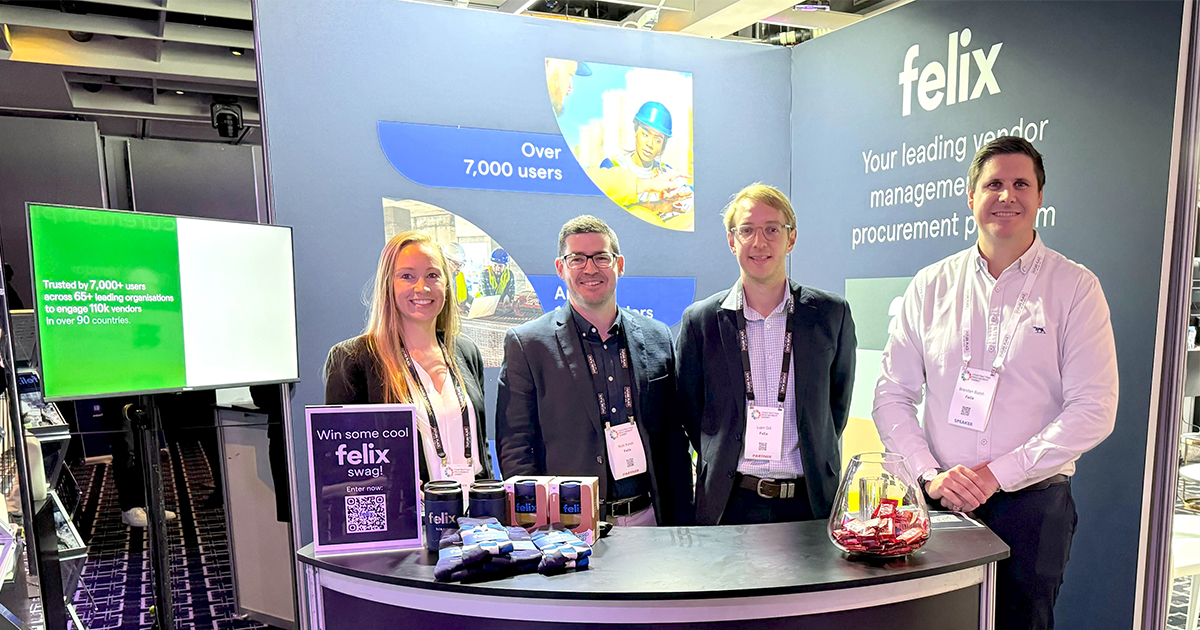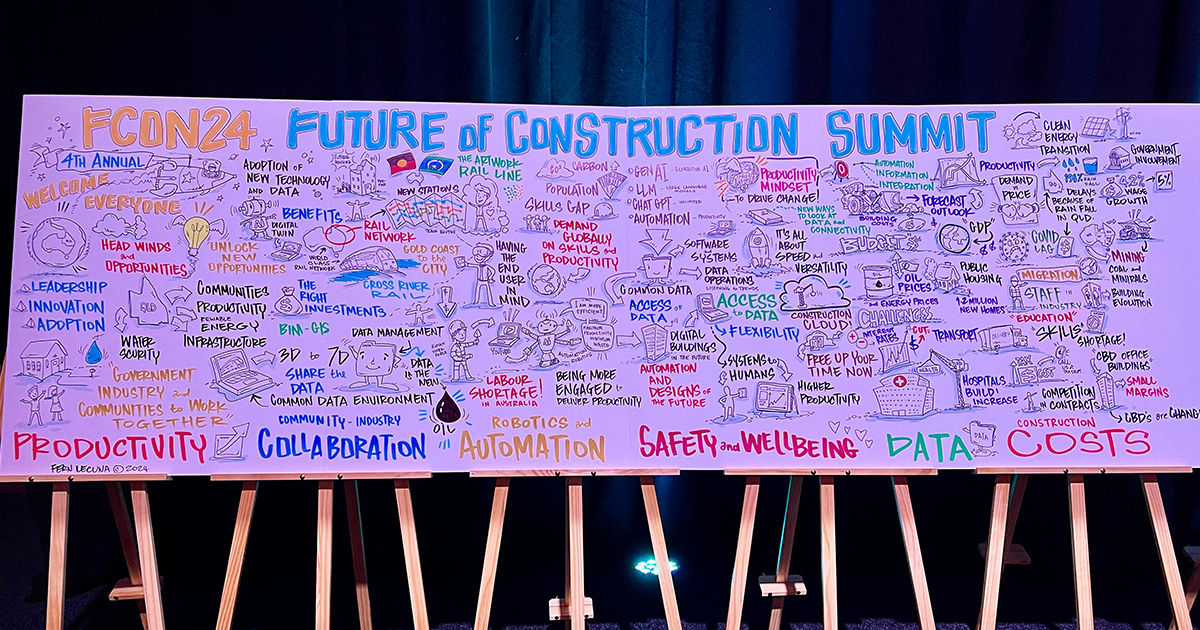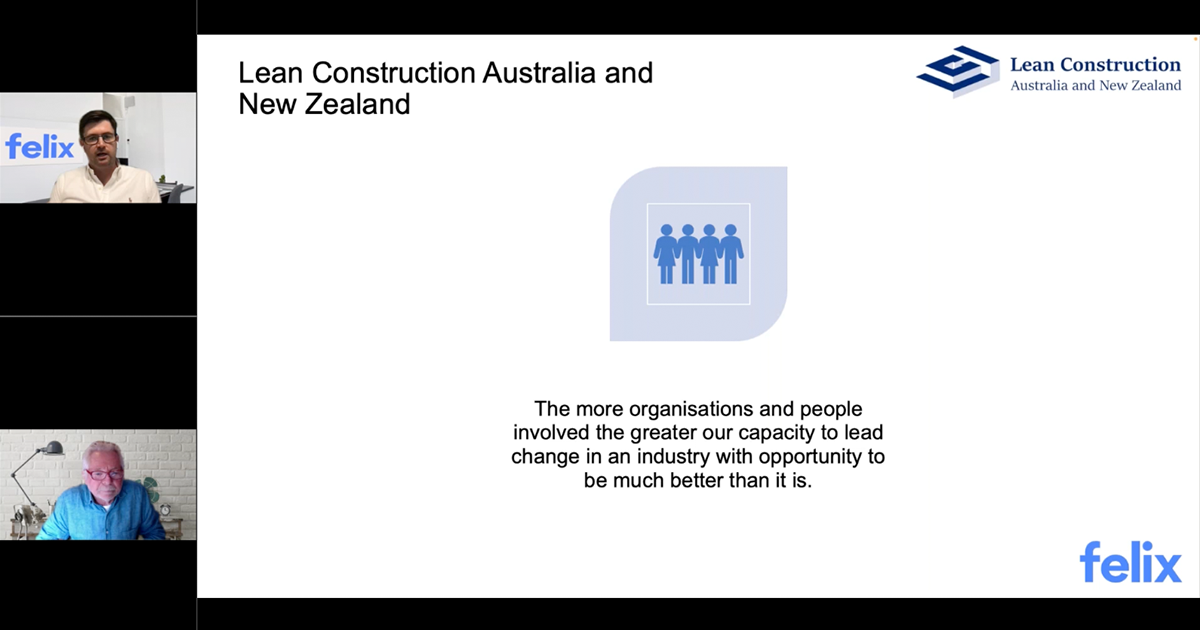Building tomorrow's procurement: 3 game-changing trends from the 2024 Construction Summit

Hosted in Sydney in late October 2024, the inaugural Construction Procurement Summit brought together senior leaders in procurement, projects, ESG, and supply chain to talk about strategies and technologies to unlock costs, increase innovation, manage risk and help sustainability. The audience heard from over 30 experts who shared their insights through a series of case studies, panel discussions and interactive roundtable discussions.
Felix was delighted to sponsor the event, which we also exhibited at and presented sessions on stage.

Three common themes underpinned the discussions on the day, which are discussed in more detail below.
Theme #1: Procurement’s growing role in project success
“If procurement goes well, the project goes well”, said Andrew McFarlane from McConnell Dowell, in his keynote speech.
This sentence alone speaks to the growing importance of procurement and supply as a function.
Typically, 60% of the value of construction projects are procurement spend. This percentage can vary depending on the size of the project but the message here is that procurements potential impact is great. It’s a very real and very large number.

Procurement is now getting a seat at the table and delivers clear and undoubted benefits.
However, in construction, procurement is more complex due to its inherent nature – no project is similar, and projects can be geographically dispersed. Unlike, for example, manufacturing where the location is unchanged from year to year. Therefore, for the construction industry, the benefits of procurement are even more significant and something that each organisation should be striving to achieve.
The findings in the Global State of Procurement and Supply Study echo this sentiment, detailing how the decisions of procurement and supply leaders impact corporate performance. An organisations success hinges on effective operations which means cost control, and effective management and use of resources – all responsibilities of the procurement function.
“We are consistently trying to push the benefit of procurement because a dollar saved in procurement is a dollar saved in the bottom-line profit of the business.”
Tony Hennessy, General Manager Corporate Services, BMD Group
Theme #2: How industry challenges can drive new opportunities
It’s no secret that there’s a myriad of challenges, burdens and pressures facing the construction industry, with this point being touched on by multiple speakers through the day.
In an ever-increasingly complex operating environment, the construction industry is also being exposed to:
- Labour and skills shortages
- Cost and productivity pressures
- New legislation and compliance requirements
- Sustainability requirements
- Increasing scale and complexity of projects
And these challenges are not slowing down, they are expected to ramp up over the coming years.
However, market pressures are a powerful catalyst for change, requiring new innovative ways of thinking. To stay competitive, organisations are adapting the way they work. The construction industry has traditionally lagged behind in innovation, but times are changing as we’re observing data-driven decision making and digital tools transforming the way companies procure and strengthen their supply chains.
Some examples we heard of during the day include:
- Using data analytics for optimal procurement insights: Connecting PowerBI to create real-time dashboards provides a granular level of visibility across topics such as spend with suppliers, social enterprises, indigenous coverage by region, size of suppliers, to name a few. Data provides an endless raft of cutting and dicing information, providing insights into opportunities and improvements.
- Supporting supply chains with tech-powered procurement: To achieve the above, using an integrated procurement system, such as Felix, that connects to your existing tech stack of DMS’s, ERP’s and BI tools builds a best-in-class digital ecosystem to support supply chain transformation, helping organisations discover the insights to realise significant opportunities ahead.

Theme #3: Procurement plays a pivotal role in effecting positive change
Today, procurement and sustainability are inextricably linked, one doesn’t operate without another, permeating their considerations and decision making.
The most seismic shift that we’ve seen in the external environment has been the expectations and obligations around ESG. In construction, ultimately ESG performance is the cumulative performance of the products and materials you purchase and the supply chain you engage.
There’s a strategic upside in transforming the way the supply chain is managed at the enterprise level to transition into a sustainability-led future. Solving the supply chain first is the foundation to drive positive, downstream procurement processes, and the organisations represented in the room are all on different stages of the maturity curve. Evolving towards this doesn’t happen overnight, a sustained and focused effort is required over a number of years to drive this cultural and behavioural change in industry. It’s a change management piece that involves executives seeing the value proposition of procurement, key personnel that are passionate about what they do.
Also touching on Theme #2, it was discussed that digital solutions to assist in this process are a mandatory part of moving forward and if you don’t evolve in that regard, then you’ll be left behind very rapidly.
“The most prevalent issue at the moment in the ESG conversations is the embedded carbon discussion, and the materials that we use is obviously a huge contributor to that. I would not like to tackle this task by drawing through manila folders to try and work this out on such a large-scale enterprise.”
Ryan Kirgan, Group Manager, Procurement, CPB Contractors

---
Brendan Batch, our Head of Enterprise Strategy and Development, also facilitated a panel on the day on the topic Exploring the macro trends driving new opportunities across construction supply chains. You can check out key takeaways from the discussion here.
Related Articles

Greater supply chain transparency and diversity will drive construction’s sustainable future
As the Australian government attempts to deliver one of the greatest infrastructure booms in its history, there exists a prevailing and urgent threat to its impact on people and planet, including on the health and well-being of its workforce.

Future of Construction Summit 2024: Key takeaways and industry insights
The Future of Construction Summit 2024 held in Brisbane brought together industry leaders, innovators, and experts to discuss the transformative trends shaping the construction landscape. The Felix team was excited to attend as an exhibitor and be part of the conversations.


Q&A recap: Lean Construction webinar
In the current environment there's plenty of negativity and fear, and plenty of bad press as well. But the organisations we see are flourishing and will come out on the other side are those that embrace the challenges head on with different ways of thinking and operating. Lean construction is certainly one of those.
Let's stay in touch
Get the monthly dose of supply chain, procurement and technology insights with the Felix newsletter.



